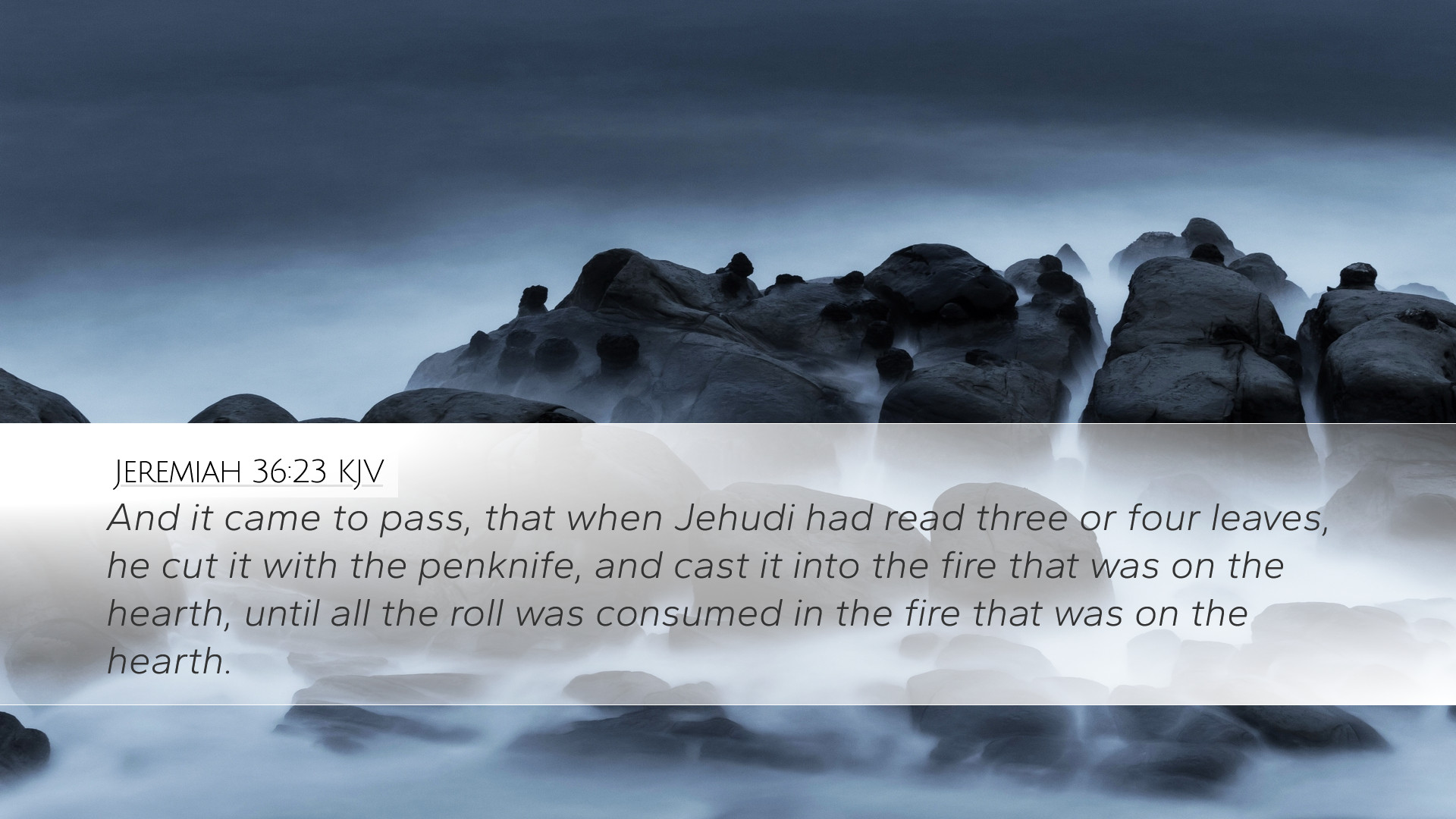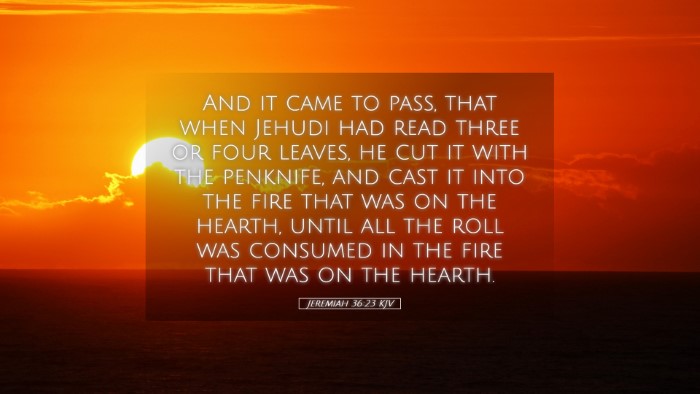Commentary on Jeremiah 36:23
Jeremiah 36:23 states, "And it came to pass, that when Jehudi had read three or four leaves, he cut it with the penknife, and cast it into the fire that was on the hearth, until all the roll was consumed in the fire that was on the hearth." This verse, deeply illustrative of the resistance to divine revelation, captures a significant moment of defiance against God's message as transmitted through the prophet Jeremiah.
Contextual Background
This passage occurs within a critical narrative in which God commands Jeremiah to write down all the words He has spoken against Israel, Judah, and the nations. The purpose of this act was to confront the people with their sins, offering them an opportunity for repentance. The context is essential for understanding the import of this episode and the actions of king Jehoiakim, who is depicted here as the antithesis of the receptive heart.
Analysis of the Verse
The Act of Reading
The act of reading the scroll is significant as it illustrates the dissemination of God’s word. According to Matthew Henry, "This was no small honor to the scroll, to have it read before the king and his nobles; it seems to have made a strong impression..." The format of “three or four leaves” indicates a sampling of the content rather than a thorough reading, suggesting a superficial engagement with the message.
The King’s Response
Jehudi’s reading is met with king Jehoiakim's stark defiance. Jehoiakim's reaction, as described, involves cutting the scroll with a penknife and casting it into the fire—the ultimate symbol of rejection and disdain for God’s communication. Adam Clarke comments on this act, stating, "The king's wickedness was increased in proportion to the light he had received..." Here, the king's willful ignorance and aggressive repudiation of divine authority stand as a profound warning about the dangers of resisting God's messages.
Symbolism of the Fire
The fire serves a dual symbolism; it is both an instrument of judgment and a metaphor for destruction of the unrepentant. Albert Barnes emphasizes that "the destruction of the roll symbolized the rejection of God’s word by the king..." In essence, Jehoiakim’s actions suggest a complete obliteration of any plea for repentance and an absolute rejection of God’s sovereignty, illustrating the tragic consequences of such a stance.
Theological Implications
This verse leads us into deeper theological reflection on the nature of divine revelation and human response. The outright destruction of God’s words acts as a stark reminder of the hostility that can exist towards the truth. Theologically, this incident affirms the doctrine of the hardening of hearts, illustrating how persistent rejection of God can lead to ultimate ruin.
God’s Sovereignty vs. Human Free Will
The tension between God's sovereignty and humanity's free will is a prominent theme throughout Scripture and is encapsulated in this verse. The very act of rejection by Jehoiakim does not thwart God's plans; rather, it serves to validate the necessity of divine judgment. As articulated by Matthew Henry, "Though men contrive against God’s word, yet God will take care of it." Thus, although Jehoiakim’s action represents the height of rebellion, it ultimately contributes to the unfolding of God’s redemptive purpose.
Historical Contextualization
From a historical viewpoint, understanding Jehoiakim's reign and the socio-political climate of Judah during this period is crucial. His rejection of the prophetic message reflects a broader trend of national disobedience and impending judgment. The act of burning the scroll not only signifies the personal defiance of Jehoiakim but represents a national turning away from God, a sentiment that had substantial repercussions leading to the Babylonian exile.
Practical Applications
For contemporary readers, particularly pastors, students, and theologians, this verse prompts several reflections:
- The Danger of Dismissing God’s Word: The actions of Jehoiakim serve as a caution against any efforts to diminish or reject the truth of Scripture.
- Engagement with God’s Command: Unlike Jehoiakim, believers are called to not only read the Word but to enact it in their lives, demonstrating fidelity in all things.
- Recognition of Divine Authority: This verse invites a reverent acknowledgment of God’s sovereignty—understanding that disregard for His Word leads to consequence not only for individuals but for entire communities.
Conclusion
Jeremiah 36:23 stands as a powerful narrative of rejection, illustrating the consequences of discarding God’s communication. Through the lens of various public domain commentaries, we can gain insights into the layers of meaning embedded in this verse. Paralleled with modern-day contexts, it serves as a profound reminder of the importance of responding positively to God’s call and highlights the gravity of rebellion against divine authority. The commitment to uphold His Word remains paramount to both individual faithfulness and communal integrity.


